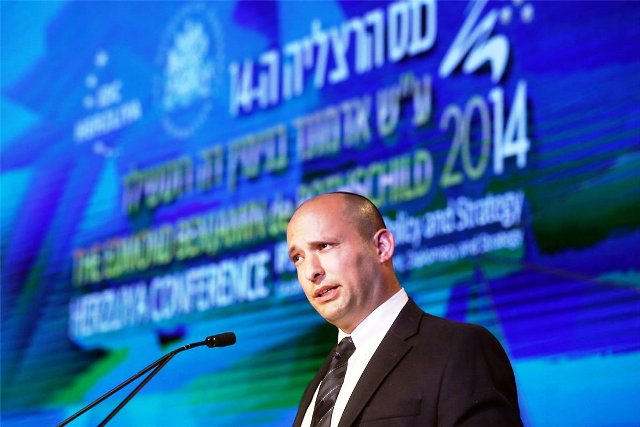
Naftali Bennett slammed Kerry over recent comments linking the Israeli-Palestinian conflict to the rise of the Islamic State of Iraq and Levant (ISIL) militant group. (Photo: MEMO)
Tel Aviv, 26 Dhulhijjah 1435/20 October 2014 (MINA) – Trying to mitigate the impact of recent criticism leveled by two Israeli cabinet ministers against U.S. Secretary of State John Kerry, Israeli foreign and defense ministers heaped praise on their country’s relations with Washington.
In a statement before his departure to the U.S. for a five-day visit, Defense Minister Moshe Ya’alon emphasized the importance of Israel’s relations with the United States, according to Middle East Monitor (MEMO) reports monitored by Mi’raj Islamic News Agency (MINA), Monday.
“Relations between the United States and Israel are based on common interests and values and some disagreement or other must not overshadow them,” Ya’alon said on Saturday in his statement as cited by Israeli Haaretz daily.
“The United States is helping Israel in a variety of areas, [including], of course, with matters of security, and we must remember this and be grateful for it and the [U.S.] leaders.”
Also Read: Israeli Forces Continue Demolitions and Strikes in Gaza Despite Ceasefire
The minister also described security ties between the two nations as “intimate,” and “unprecedented.”
Ya’alon’s statements came one day after Israeli Economy Minister Naftali Bennett slammed Kerry over recent comments linking the Israeli-Palestinian conflict to the rise of the Islamic State of Iraq and Levant (ISIL) militant group.
“Kerry’s claim that failure of the Israeli-Palestinian peace talks strengthens ISIL is encouraging global terrorism,” Israeli Economy Minister Naftali Bennett wrote on his Facebook page Friday.
Communication Minister Gilad Erdan also slammed the U.S. state secretary, saying the latter’s remarks had demonstrated a “lack of understanding” of the Israeli-Palestinian conflict.
Also Read: Hamas Returns Remains of Another Israeli Hostage Under Gaza Ceasefire Deal
Speaking to Israel’s Channel 2 one day later, Foreign Minister Avigdor Lieberman rebuked Bennett over his criticism of Kerry while lauding the U.S. support for Israel.
“There can be disagreements among friends, but one doesn’t have to attack someone,” Lieberman said, Haaretz reported.
He went on to say that Bennett’s remarks “might earn him votes, but cause [Israel] a lot of damage.”
“When the supply of ammunition ran out during Operation Protective Edge [in Gaza], it was the United States that supplied it,” Lieberman said.
Also Read: Knesset Approves Draft Law Allowing Israelis to Own Property in Occupied West Bank
“The Americans were the ones who gave the money for Iron Dome. The United States was the one that helped us at the United Nations Human Rights Council and they prevent a lot of trouble in the Security Council with vetoes.”
On Thursday, Kerry drew a distinction between the Islamic faith and the ISIL, linking the latter to poverty in the Middle East and the festering Palestinian-Israeli conflict.
“Balfour Declaration”
The roots of that conflict date back to 1917, when the British government, in the now-famous “Balfour Declaration,” called for “the establishment in Palestine of a national home for the Jewish people.”
Also Read: Heavy Rains Flood Tents of Displaced Palestinians in Southern Gaza
Jewish immigration rose considerably under the British administration of Palestine, which was consolidated by a League of Nations “mandate” in 1922.
In 1948, with the end of the mandate, a new state – Israel – was declared inside historical Palestine.
As a result, some 700,000 Palestinians fled their homes, or were forcibly expelled, while hundreds of Palestinian villages and towns were razed to the ground by Jewish forces.
The Palestinian diaspora has since become one of the largest in the world. Palestinian refugees are currently spread across Jordan, Lebanon, Syria and other countries, while many have settled in refugee camps in the Palestinian West Bank and Gaza Strip.
Also Read: Death Toll in Gaza Reaches 69,775, Majority Women and Children
Israel then occupied East Jerusalem and the West Bank during the 1967 Middle East War. It later annexed the holy city in 1980, claiming it as the capital of the self-proclaimed Jewish state – a move never recognized by the international community.
Palestinians demand the establishment of an independent Palestinian state in the Gaza Strip and West Bank, with East Jerusalem – currently occupied by Israel – as its capital.
For many Palestinians, the right to return to their homes in historical Palestine – a right enshrined in U.N. General Assembly Resolution 194 – remains a key demand. (T/P3/R01)
Mi’raj Islamic News Agency (MINA)
Also Read: Israel Urges Indian Jews to “Return” to Zionist-Occupied Territories in Palestine



































 Mina Indonesia
Mina Indonesia Mina Arabic
Mina Arabic